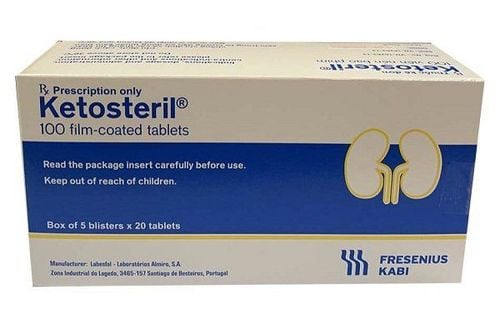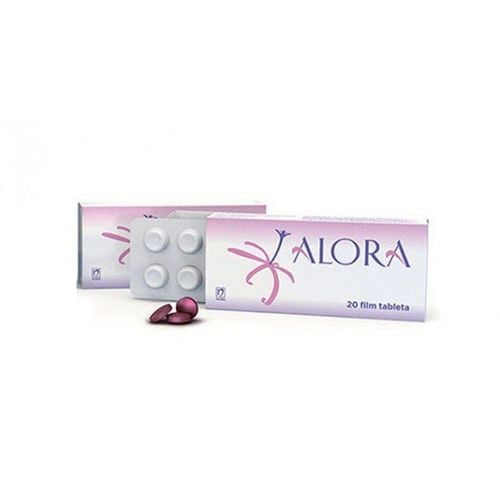This is an automatically translated article.
When it comes to motivation for a good night's sleep, people often don't think about the body's hormonal factor. However, hormonal disorders that cause insomnia are one cause, and it is sleep that allows many of the body's hormones to be produced to create energy, increase immunity. So, understanding the relationship between hormones and sleep can help improve your sleep and your health.
1. What are hormones?
The body's hormones are like chemical messages in the blood that cause changes in specific cells or organs and surrounding tissues. For example, the hormone adrenaline is produced by the adrenal glands located above the kidneys and helps the body prepare to respond during times of stress. As such, the function of hormones is to help control many bodily processes, including growth, development, reproduction, stress response, metabolism, and energy balance.
Besides, hormones are also involved in sleep in a number of different ways. Therefore, when the patient has insomnia, one cause to keep in mind is the possibility of a hormonal disorder causing insomnia.
2. Hormones influence sleep through stress levels
Certain hormones, such as adrenaline, make the brain feel more alert and ready for action. This makes it difficult for the body to fall asleep. To prevent this consequence, it is best for people to do relaxing activities before going to bed, rather than doing stressful jobs or intense exercise.
On the other hand, during prolonged stress, the adrenocortical hormone in the pituitary gland triggers the release of cortisone and cortisol from the adrenal glands. Adrenal cortex hormone levels tend to be higher in people with insomnia than those who sleep well, which in turn experience hormonal insomnia. This also suggests that overstimulation and constant stressors contribute to insomnia.
In fact, elite athletes can often find it difficult to sleep because of their tendency to excrete high levels of cortisol throughout the day, including in the evening and after a tiring day of training.
3. The hormones released during sleep strengthen the immune system
Sleep is the time when certain body hormones are released into the bloodstream, including growth hormone, which is essential for tissue growth and repair, including in adults.
Besides, sleep also helps balance the body's appetite by maintaining optimal levels of the hormones ghrelin and leptin. So, when people sleep less than usual, people may feel like eating more, which can lead to weight gain.
In addition, sleep also controls the levels of the hormones insulin and cortisol so that when you wake up, the body feels hungry, promoting ready for breakfast as well as ready to face the stress of the day.
Accordingly, hormonal disorders that cause insomnia not only cause the body to sleep less than usual, but prolactin levels can also be imbalanced and have a weakened immune system, difficulty concentrating and craving carbohydrates during the day.

Các hormone được giải phóng khi ngủ vì vậy rối loạn nội tiết tố mất ngủ
4. Hormones prevent having to wake up at night to go to the bathroom
Changes in hormone levels during sleep, including higher levels of aldosterone and antidiuretic hormone, act on the kidneys to increase water reabsorption, concentrate urine, and prevent the body from needing to go to the bathroom . From there, the brain is rested longer with deeper, better quality sleep.
In children, while the hormonal system is still developing, bedwetting can be partly influenced by low levels of antidiuretic hormone.
This is why in people with insomnia, the endocrine system often urinates continuously at night.
5. Hormones make the body feel sleepy at night
Hormone levels also affect the time when the body feels sleepy or awake - the circadian clock or sleep-wake cycle. Most important is the hormone melatonin, which is released when darkness approaches and lets the body know it's time to sleep. This is why being around too much light before bed can affect sleep as it can block the release of melatonin. And that's also why night shift workers often have trouble sleeping during the day.
Although there is artificial melatonin available to treat insomnia, if taken at the wrong dose and at the wrong time of day can make things worse, so it's best to just use melatonin. under the guidance of a doctor.
6. Hormones wake the body up in the morning
Levels of the hormone cortisol decrease before bed and increase at night, peaking just before waking up. This acts as a wake-up signal, stimulating appetite and energy in the body.
When traveling a long distance, across many different time zones, the body's sleep-wake cycle takes a while to adjust. So cortisol levels rise and feelings of hunger can occur at inappropriate times of the day.

Rối loạn nội tiết tố mất ngủ có thể ảnh hưởng tới sức khỏe của người bệnh
7. The problem of hormonal disorders, insomnia and sex
For women, changes in sex hormones affect sleep significantly. Indeed, the relationship between hormones and sleep-wake cycles in women is also influenced by the menstrual cycle. Just before a woman's period, hormonal changes, including a sudden drop in progesterone levels, affect the body's temperature control, which in turn can reduce the length of sleep." REM”. This is the stage of sleep when most dreams will occur.
For women with severe premenstrual symptoms, falling melatonin levels at bedtime just before their period can cause poor sleep, including nighttime awakenings or daytime sleepiness.
Changes in hormone levels also contribute to difficulties during pregnancy. Increased progesterone levels can cause daytime sleepiness, especially during the first trimester. High levels of estrogen and progesterone during pregnancy can also cause nasal swelling and lead to snoring.
Until menopause, low estrogen can contribute to trouble sleeping. Changes in hormone levels mean a less stable body temperature and possibly an increase in adrenaline levels, both of which can affect sleep. In addition, a decrease in estrogen causes more body fat to move to the stomach area, which increases the likelihood of women developing snoring and sleep apnea as they enter perimenopause.
For men, the highest testosterone levels are reached during sleep and at least three hours of sleep is needed to reach this peak. Low testosterone levels in men, which can occur with sleep deprivation, aging, and physical problems, are associated with decreased sleep efficiency and altered sleep stages that men experience. need to go through. It is for this reason that testosterone supplements can be used as a drug, but overuse can lead to other sleep problems.
In summary, because hormonal disorders cause insomnia, having a healthy, regular daily routine can support a good night's sleep. This can be achieved by reducing stress, engaging in relaxing bedtime routines, getting into bed, and waking up on time. If you have insomnia, you should seek professional help to treat as well as facilitate appropriate hormone supplementation activities, thereby contributing to improving sleep quality and optimizing your health.
Vinmec International General Hospital is one of the hospitals that not only ensures professional quality with a team of leading medical doctors, modern equipment and technology, but also stands out for its examination and consultation services. comprehensive and professional medical consultation and treatment; civilized, polite, safe and sterile medical examination and treatment space.
Please dial HOTLINE for more information or register for an appointment HERE. Download MyVinmec app to make appointments faster and to manage your bookings easily.
Reference source: healthline.com












